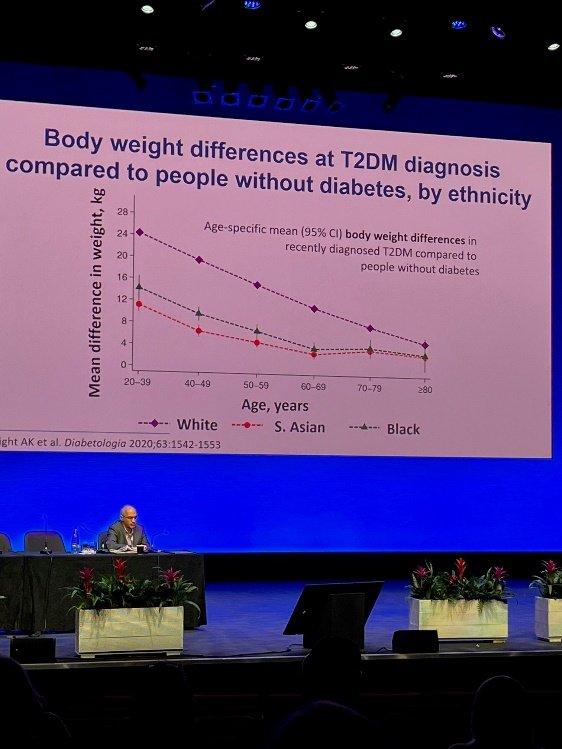Guest Post: Grande Challenges!
Grande Challenges!
I thought Day 2 of the Diabetes UK Professional Conference might be easier. Maybe get some lunch and not spend so much time on my feet. I was a bit wrong. (Read Day One from Rob)
Ethnicity as a risk factor in T2
Today, I was able to spend more time in the presentations (and not just because I needed to sit down) mostly about diabetes causation and – drum roll - a cure. The day opened with an impressive lecture about the genetic links to diabetes. For me the takeaway was that Black and South Asian people develop type 2 when they’re skinnier than white people.
The rest of the morning I spent chatting with the awesome reps at Insulet and Dexcom. I got my hands on a Dexcom G7. It’s a real upgrade on my current Libre 2 because of the volume of real time data I could get out of it without a third party app. It’s small, really small, and much easier to apply than the G6. It may not seem important, but the box footprint is way smaller than the Libre 2 or the G6. This may sound trivial but with 3 Libre 2 users in the house, storage space is a genuine issue if we all get our scripts at the same time. Now I just need to persuade the kids to switch to Dexcom.
Omnipod 5 really is coming to the UK. And from what I heard, it may even be here sooner than we thought. The UK launch is going to be a “soft” one to avoid medics being hassled by all the current Dash and Eros users looking to upgrade. Cost shouldn’t be a barrier in the UK but appropriate staff training might be: HCP’s won’t be handing these out until they’ve been trained to use them.
The G7 is really, really tiny
After lunch we learned of the “Grand Challenge”. The Steve Morgan Foundation has donated an enormous £50 million to the prevention of T1 diabetes, and its cure through the development of robust stem cells that can grow into Beta Cells (without dying too quickly – that’s the barrier right now) and the development of smart insulins... that might be taken orally. As challenges go, “Grand” is an understatement.
Research on prevention seems the most advanced of these three things right now. Anyone who saw the slide I posted for the first day of the conference will recognise the increased risk of Type 1 among those with a family member already diagnosed. So far, as you can hear on Juicebox Podcast Episode #452, they’ve been able to delay the onset of Type 1 by around 2 years through the drug Teplizumab . As for a cure, it is progressing. As the implanted cells live longer and longer in their new homes, they present different problems over time. Slowly but surely, these problems are being overcome. As ever, we can look forward to a cure in ten years time… But real advances are being achieved already.
I finished the formal part of the day listening in to the discussions on eating disorders in diabetes. A shocking 40% of female teenage girls with type 1 in the UK suffer from a degree of diabulimia in which they consciously control their wait by avoiding injections. And it’s complex. We were addressed by the awe inspiring Jennifer Mahammodi. Jennifer was diagnosed at the age of 12. Her mother found it hard to help her manage with the result that there were a series of DKA hospital admissions – and Jennifer learned to associate those admissions with a time of caring and security, until she entered a cycle of almost fortnightly hospital admissions before being placed back into another foster care placement. Ultimately, living alone in social housing at the age of 19 she suffered, alone, a Christmas Day DKA episode so severe she could barely see. Thankfully, the adult care team at King’s College Hospital were able to provide psychological support and get her to a very much better place. It was a deeply moving address: amongst dozens of battle hardened HCPs there were very few dry eyes and it was the only address that I saw receive a standing ovation.
To cap off the day, I was invited to attend the presentation of a research award to Professor Roy Taylor. He’d been quite a presence at the conference putting questions to different panels with incisive intelligence and a dry wit. He pioneered the remission of Type 2 through rapid weight loss. As one of his colleagues pointed out to me, even if the diabetes isn’t remitted, weight loss is still a good idea for most Type 2s.
BOB
Rob (Bob Dee) Darbyshire




























